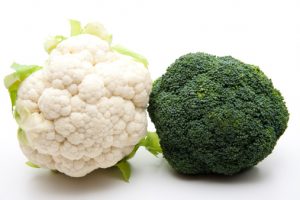 You’ve seen them side by side in the produce aisle, but have you ever pondered their differences? Sure, one is green and one is white, but it goes much deeper than that. Discover the nutritional similarities and differences between these two vegetables and learn once and for all which is healthier – broccoli or cauliflower?
You’ve seen them side by side in the produce aisle, but have you ever pondered their differences? Sure, one is green and one is white, but it goes much deeper than that. Discover the nutritional similarities and differences between these two vegetables and learn once and for all which is healthier – broccoli or cauliflower?
Vitamins
While both veggies are rich in vitamins A, C, and K, broccoli beats cauliflower, containing more of all three vitamins. In fact, one cup of broccoli contains 135 percent of your daily vitamin C intake, 11 percent of your vitamin A intake, and 116 percent of your vitamin K intake. In comparison, one cup of cauliflower accounts for 87 percent of your daily vitamin C requirements, has no vitamin A, and contains 21 percent of your daily vitamin K.
Protein
Advertisement
The average man requires approximately 56 grams of protein daily, while the average woman requires around 46 grams. These numbers change with the level of activity you engage in, as well as your body type and age, however, for our purposes, they will serve as a guideline. Both broccoli and cauliflower contain a similar amount of protein in once cup, with broccoli weighing in at 2.6 grams and cauliflower at 2.1 grams. While neither are a significant source of protein, they do provide the macronutrient naturally and without the added sugars of protein bars and shakes.
Calories
Both vegetables are low in calories, making them a great snack for anyone watching their daily caloric intake. Broccoli contains 31 calories per cup, while cauliflower contains 27 calories per cup. These number do not reflect how the vegetables are prepared, however. Adding butter or a veggie dip will increase your calorie count.
Minerals
Broccoli and cauliflower both contain important minerals such as calcium, iron, magnesium, phosphorous, potassium, zinc, and folate. Broccoli has nearly double the amount of calcium per cup, with 4.3 percent of your daily intake, in comparison to cauliflower’s 2.4 percent. Both have similar amounts of iron per cup, with broccoli containing four percent of your daily requirement and cauliflower three percent. Broccoli also contains 4.8 percent of magnesium, six percent of phosphorous, and 8.2 percent of potassium per cup, while cauliflower has four percent of magnesium, 4.7 percent of phosphorous, and nine percent of potassium per cup. Both have nearly the same amount of zinc, though broccoli contains a slightly higher 2.6 percent of your daily intake per cup while cauliflower contains two percent.
The health benefits of broccoli and cauliflower
These crunchy cruciferous vegetables aren’t just packed with vitamins and minerals, they also come with an array of health benefits for everything from your heart and eyes to cancer prevention.
Cancer: Broccoli and cauliflower both contain compounds that can help detoxify carcinogens and prevent the development of some cancers. A review in Advances in Experimental Medicine and Biology also found an association between the consumption of broccoli and cauliflower (along with Brussels sprouts and kale), and a lower risk of developing cancer.
Heart: Both vegetables are packed with vitamins and minerals that are great for the health of your heart. Broccoli has anti-inflammatory properties that help prevent blood vessel damage, and can help to reduce your cholesterol levels. The nutrients in cauliflower can help to prevent issues associated with cardiovascular disease like arterial wall damage, and potentially lower your risk of stroke.
Eyes: Broccoli specifically is great for eye health and may help those with vision problems like cataracts, as well as prevent damage from free radicals.
Advertisement
Digestion: Both broccoli and cauliflower contain lots of fiber that is great for your digestive health. Cauliflower also contains anti-inflammatory properties that can help with conditions like ulcerative colitis, irritable bowel syndrome, and Crohn’s disease.
So, which is healthier, broccoli or cauliflower? While both vegetables are packed with essential vitamins and minerals your body needs to function correctly, broccoli comes out on top due to its higher vitamin A, C, and K content, as well as its greater amount of the minerals calcium, magnesium, phosphorous, iron, and zinc. This isn’t to say that you should cut cauliflower out altogether, as the white cruciferous vegetable is a close runner-up in terms of vitamins and minerals, and offers many of the same health benefits of its green cousin.
Related: Broccoli and osteoarthritis: Could the superfood fight against arthritis?
